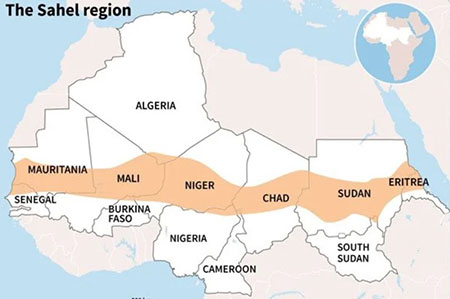Special to WorldTribune.com
 By John J. Metzler, February 6, 2024
By John J. Metzler, February 6, 2024
While the wars in Ukraine, Gaza/Israel, and the Red Sea have grabbed the headlines, there’s a dangerously developing security situation throughout large parts of the African continent.
The systemic chaos which has befallen a string of countries in the Sub-Saharan Sahel region has gone largely unnoticed by most of the media, except perhaps for Boko Haram’s mass kidnappings in Nigeria.
“In just a few short years, Africa has become a global epicenter of terrorism,” warned UN Secretary General Antonio Guterres, “This growing inferno is engulfing millions of Africans.”
Addressing a meeting of the Global Counter-Terrorism Compact, the Sec. Gen. stated, “Across the continent, Da’esh, Al Qaida and their affiliates are exploiting local conflict dynamics and fragilities to advance their agendas.”
 The problem stems from a spate of simmering conflicts in the Sahel states such as Mali, Burkina Faso, Niger and Chad, as well as the endemic collapse of political institutions in much of this landlocked former French colonial region.
The problem stems from a spate of simmering conflicts in the Sahel states such as Mali, Burkina Faso, Niger and Chad, as well as the endemic collapse of political institutions in much of this landlocked former French colonial region.
Besides entrenched insurgencies, a series of Coup d’Etats (government overthrows) have plagued the countries and seen military regimes replace largely incompetent or corrupt civilian governments. While this is not entirely new, the fact remains that France, the former military and economic “protector” of the region, has largely pulled out during the Presidency of Emmanuel Macron, thus leaving a dangerous power vacuum which has been filled by Russian mercenaries and a gaggle of jaded political players.
Sec. Gen. Guterres admonished, “Across the Sahel, the increased hostilities between terrorist groups fighting for control over territory and trafficking are creating nothing short of a hell on earth for the innocent people caught in between.”
That’s usually the way, with helpless civilians caught in the crossfire or the undertow of government corruption and incompetence.
But there’s a larger threat beyond the alphabet soup of militants and military regimes. There’s a growing scourge of human trafficking both inside Africa itself, especially West Africa, as well as the organized people-trafficking cartels using the well-traveled migrant corridors heading north to Tunisia or to lawless Libya. From here migrants from Nigeria, Senegal and the Sahel states cross the Mediterranean to illegally enter the European Union in Spain or Italy. This trafficking into Italy, via mostly Tunisia, saw numbers jump to 155,000 in 2023.
In recent months the threat is spreading to coastal countries, such as Benin and Togo, the Secretary General added. He added, “Growing their continental networks with more fighters, funding, and weapons. Forging ties with transnational organized crime groups… Terrorism is an all-out assault on civilization itself.”
This is all a witches brew of violence, instability and foreign fighters.
In Sub-Saharan Mali, just a decade ago a tough French-led military force partnered with the central government to fight militant jihadi groups. Yet despite initial success Mali, as well as neighboring Burkina Faso and Niger have seen military coups favoring or backed by Russia. Correspondingly, the local rulers in Mali have forced out the UN peacekeepers and the French, thus handing security responsibilities to Russia’s Wagner mercenaries.
Moscow’s influence has grown regionally from Mali to Sudan, the Central African Republic and Libya.
Following a military coup in July, resource-rich Niger’s new military junta forced France to withdraw its troops. In October the United States cut off $500 million in assistance to the insurgency-plagued Sahel state.
Interestingly Niger had been the key to American moves to counter jihadists who have ravaged the Sahel, with the United States building a $100 million military base in the desert city of Agadez to operate offensive drone operations.
|
In Sub-Saharan Mali, just a decade ago a tough French-led military force partnered with the central government to fight militant jihadi groups. Yet despite initial success Mali, as well as neighboring Burkina Faso and Niger have seen military coups favoring or backed by Russia. |
Africa is again becoming the nexus for United States/Russia confrontation. Chad’s military junta leader was welcomed by Vladimir Putin in the Kremlin; Moscow says it will help Idriss Déby “stabilize” his country. At the same time U.S. Secretary of State Antony Blinken recently visited West Africa to offer aid and security assistance to various states.
The UN’s Guterres advised, there are two essential elements in fighting against terrorism and violent extremism, “First, our efforts must be anchored in sustainable, inclusive development.” He warned, “Terrorism finds its home in fragility and instability.” Secondly, “our efforts must be anchored in human rights. Terrorism represents a denial of human rights.”
Sub Saharan Africa’s descent into a trajectory of widening instability underscores the global escalation of violence from smoldering crises to full blown wars; Ukraine, Gaza, the Red Sea.
Western states must awaken to this embryonic threat.
Sahel insurgencies thrive in restive regions which nobody is paying attention to until it’s too late.
John J. Metzler is a United Nations correspondent covering diplomatic and defense issues. He is the author of Divided Dynamism the Diplomacy of Separated Nations: Germany, Korea, China (2014). [See pre-2011 Archives]
